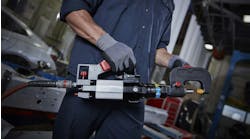For the first several years of ownership, Jim Fonzi had his nose in every aspect of his business, Gates Automotive in Rochester, N.Y. Although it was successful for the first few years, his micromanaging style caused his shop’s growth to plateau.
Around that same time, Fonzi was struck with the news that his wife had Stage 3 colon cancer. It forced him to take a step back from his business and push other employees into management roles. He was surprised by how smoothly the business ran without him, and he started transitioning into a different role.
When I had to step back to support my wife through her cancer treatments, I realized my guys could do a better job running the day-to-day operations when I wasn’t standing over their shoulder all day. From that point on, the micromanaging was over. My employees were able to use their own judgment and do what they knew was right, and it was clearly better for the business.
Shortly after that, at age 52, I had a decision to make. I had to decide if I should sell the shop and find something else to do or reinvest in the business and approach it with a completely different mindset.
Because I had previously worked in a local dealership, I knew there was an area of opportunity in that central part of town that wasn’t being filled and I decided to jump in with both feet. I bought a building for my second location in that booming part of town. The building itself was ugly but after a year of restorations, you couldn’t even recognize it. We filled it with art from local artists and made furniture out of auto parts. It is truly a beautiful building now.
When we opened the second location, I expected to be in the red for two years. We were in the red for one month, the second month we broke even and from then on we were making money. Besides a few red months in the second year, the growth was consistent. The store has been open for four years now, and our average growth is just under 30 percent each year.
From the first day we opened the shop, our customers could expect the same excellent service they received at our original location and that can be credited to our talented, results-oriented technicians and our management staff that focuses on serving its employees, not the other way around.
We don’t just find talented employees and cut them loose, especially for our management team. We grow our most valuable employees. Almost everyone in our management structure started out as lower-level employees of the shop.
Matt Cutaia, the current general manager of our second location, started working for Gates as a part-time tow truck driver. He approached me one day and expressed his ambition to grow in our company. I knew he could succeed in such a role because he had already showed leadership qualities as a truck driver. When things didn’t go well for him, he took full responsibility, learned from his mistakes and put personal systems in place so the mistakes would not happen again. He was respected by everyone and had a contagious positive attitude and great work ethic. I told him I would attach him to my hip and teach him the business for as long as it took. I was very tough on him but he understood that it was to help him learn and grow. After two years of shadowing me, he was ready to manage our largest location.
Today, Matt is a much more effective manager than I ever was. He runs a huge facility here with a smile on his face every day, and that’s not easy. Its not an easy job and he handles it beautifully. Recently, Matt has taken a promising, young employee under his own wing and helped him work his way up the ranks from technician to service manager to assistant body shop manager and currently the shop manager of our original location. This is how we build all of our managers.
Our VP of operations, Tony, started with us as a mechanical technician. I gave him the opportunity to take charge of our towing business, which is just a small part of our revenue, but a great way to get our name in front of potential customers. He was very successful in growing that part of the business and thanks to Tony, we now do 50 percent of the towing business in the county. Tony, a partner who owns 10 percent of the company, will eventually be working into in-house management. I know he will be successful because he will do whatever it takes to make this place succeed.
All throughout the day, I try to make myself seen as much as possible by employees and personally thank as many customers as I can. I am at the larger of our two locations every day and visit the other two or three times a week. Making sure everyone feels comfortable and respected in our shop is a priority. To do that, we have to surround ourselves with the right people and that begins with the hiring process.
We only hire master technicians—that’s it. There are a lot of young guys out there that are excellent technicians, but we’ve found that hiring more experienced people helps them appreciate our business plan more. If they’ve worked for a previous employer who had terrible management or no employee benefits, they value those things a lot more when they receive them here and are more likely to respect our business and work their butts off for us.
Of course there are occasional employee conflicts but not very many. If there is an employee that doesn’t get along with people, they just can’t work here, period. We recently had to let someone go that was an excellent technician but he couldn’t get along with people. It was difficult to let someone that talented go but it’s not worth risking the positive environment that we’ve worked so hard to create.
One way we’ve created a non-competitive environment between our two locations is by basing pay plans on corporate-wide success. Especially since our original location typically handles smaller jobs and the second location handles the larger ones, I didn’t want one shop to hold onto a vehicle that they didn’t have time for and risk customer satisfaction so they could get a little more commission.
This has created an environment where I am not their only connection; the body shop managers can lean on each other for help.
I consider myself a coach and an administrator. Brainstorming and implementing marketing strategies for the shop is a big part of my job now. I touch base with it every day. We recently added 4,000 square feet to our original location, and I handled all of the construction details on the project. I’m also in charge of purchases for the shop, like equipment and company vehicles.
Every Friday, I make it a priority to walk around the shop floor and hand each employee their pay stub, shake their hand and thank them for their dedication to Gates. The company is at a great size right now (55 employees) where I can know each employee on a personal level. I know them and their families and I think that really helps make everyone feel comfortable when they walk into work. I’m also opening the door for comments, criticisms or whatever is on their mind. If they’re not comfortable talking to their manager about something, this gives them an opportunity to come directly to me.
It’s not uncommon for managers to come in and discuss issues with me during the day. I will share experiences and advice with them but it’s not my job to tell them what to do. It’s my job to help them realize the right decision. Our shop’s motto focuses on ethics and promises that we will do the right thing. It lists our core values of ethical business practices, environmental sustainability, quality workmanship and outstanding customer service.
If we owe something to somebody, they will get it. If there is a benefit of doubt to give, it’s given. I believe when you start serving your own needs and you don’t pay attention to what is right or ethical, that is when your business will really suffer. What it really boils down to is that we all know what is right, and should do the right thing.




